Healing Hearts: Recognising and Addressing Childhood Trauma on World Trauma Day 2023
October 17th marks World Trauma Day, a day dedicated to raising awareness of the quiet suffering caused by trauma in individuals and communities.
These wounds are often concealed beneath smiles and laughter as trauma knows no bounds, affecting millions worldwide, including our children. Various social ills including abuse, neglect, violence and natural disasters, contribute to these experiences.
At Zoë-Life, we firmly believe that every child deserves a safe and nurturing environment to grow, learn and thrive. However, we know that that is not always possible. Unfortunately, in today’s complex world, many children experience traumatic events that can have a lasting impact on their emotional well-being.
As parents and caregivers, it is important to recognise the early warning signs of trauma in children and take action to support their healing process. Additionally, create safe spaces in which children can express themselves and seek professional help when necessary. Thus, fostering a supportive community and building the essential steps in helping children overcome the impact of trauma.
Trauma in children can manifest in various ways, affecting emotional, cognitive and social development. While children may not always articulate their feelings clearly, there are several signs that might indicate they are struggling with trauma including:
Changes in Behaviour
Sudden and drastic changes in behaviour such as withdrawal, aggression, or excessive clinginess can indicate emotional distress.
Academic Decline
A sudden drop in school performance, lack of concentration, or disinterest in activities once enjoyed might point towards underlying trauma.
Sleep Disturbances
Nightmares, night terrors, insomnia or bedwetting beyond the age-appropriate period can be signs of trauma affecting a child's sleep patterns.
Fear and Anxiety
Excessive fear, phobias, or anxiety about specific situations or places could stem from traumatic experiences.
Physical Symptoms
Unexplained headaches, stomach aches or other physical complaints without a medical cause can be manifestations of psychological distress.
Regression
Reverting to behaviours typical of younger children, like thumb-sucking or bedwetting, can be a way for a child to cope with trauma.
As parents and caregivers there are several steps you can take to help your child heal from trauma and build resilience:
Open Communication
Create a safe space where your child feels comfortable talking about their feelings. Be a patient listener and validate their emotions.
Professional Help
If you notice persistent signs of trauma, consider consulting a mental health professional specialising in child trauma. Therapy can provide essential tools for coping and healing.
Establish Routine and Stability
Children thrive on routine and stability. Establish consistent daily routines to provide a sense of security.
Encourage Expression
Encourage your child to express their emotions through art, journaling, or play. These creative outlets can help them process their feelings.
Promote Healthy Coping Strategies
Teach your child healthy coping mechanisms such as deep breathing, mindfulness or physical activities like yoga or sports.
Lead by Example
Demonstrate healthy emotional regulation and coping mechanisms in your own life. Children learn by observing the adults around them.
Foster a Supportive Community
Surround your child with positive influences, whether it be supportive friends, family, or community activities that nurture their self-esteem.
On this World Trauma Day, let us come together as a community to recognise the signs of trauma in children and provide the support and love they need to heal.
By fostering a nurturing environment and being vigilant about the well-being of our children, we can break the cycle of trauma and ensure that every child grows up in a world where they are valued, protected, and empowered to reach their full potential.





